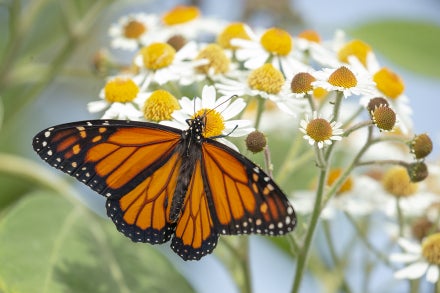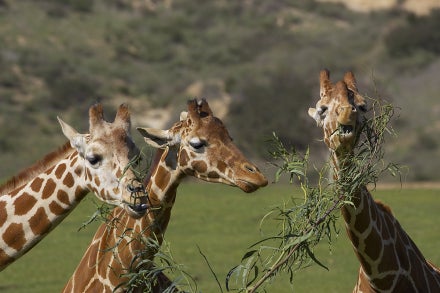Image

Zoo InternQuest is a seven-week career exploration program for San Diego County high school juniors and seniors. Students have the unique opportunity to meet professionals working for the San Diego Zoo, Safari Park, and Institute for Conservation Research, learn about their jobs, and then blog about their experience online. Follow their adventure here on the Zoo’s website!
 What’s the formula (get it, like baby formula) for successfully bottle-feeding a baby Bonobo? Kim Weibel, a San Diego Zoo keeper who works in the Neonatal Assisted Care Unit (NACU), could tell you. Ms. Weibel spends most of her time around baby animals— essentially, living the dream. However, there is something special about her particular job. Ms. Weibel provides help to baby mammals that would otherwise not be able to succeed. By ensuring not only that the Zoo’s baby mammals are alive and thriving, but also that these animals are successful, Ms. Weibel is what I like to call conservation hero.
At any hour of the night, Ms. Weibel may be called in to aid one of her patients. Given that babies need to nurse around the clock, a few late nights are just a part of the job description. The bottle-feeding process is a huge aspect of Mrs. Weibel’s job. The mothers of most of the baby animals she treats will not nurse their young. This is based on instincts that the mothers would have in the wild; weaker offspring are often abandoned due to their low chance of survival. However, in a zoo setting, sick and injured babies can be properly cared for and nursed back to health by trained professionals. Every time the NACU unit saves a baby, another animal is added to the species’ population. This is great news for endangered mammals, and the numbers begin to add up quickly.
After treatment in the NACU, Ms. Weibel considers the future of the baby. One of the possible paths is for the animal to become an animal ambassador. In this position, the animal along with a keeper or educator would interact with the general public, educating incoming Zoo guests about the importance of conservation. Animal ambassadors are vital in spreading the conservation message— when someone can interact with the animal they may be unintentionally harming, the need to stop destructive practices becomes tangible.
The impact of the NACU unit expands way past the San Diego Zoo, stretching to international zoos all over the globe. The NACU has file cabinets brimming with detailed instructions on how to properly care for baby animals. Whenever another zoo needs information on how to raise a cute critter, the Zoo’s NACU team can send them a three-page summary that tells them everything they need to know, including records that track the progress of past patients. The San Diego Zoo’s NACU team is even exchanging information with zoo keepers in China about raising baby pandas. Can you believe that Zoo keepers— right here in San Diego— are helping increase panda populations all the way across the globe?
Whether it be in Asia or in our own backyard, Ms. Weibel and the other NACU keepers are helping to save the lives of the most vulnerable— babies. These animals are the future of their species and contribute to increasing populations. The Zoo’s NACU team has empathy, dedication, and hard work, all bottled up into one delicious— and impactful— formula.
How can you be a conservation hero like the rest of the NACU team? One way to help out is to donate to conservation efforts for endangered mammals. If you do not feel like donating your money, you can always donate your time. Volunteering at your local animal shelter can be just as effective. You may not be able to save endangered animals, but you will ensure the success of some very thankful (and adorable) puppies and kittens out there.
Dana, Conservation Team
Week One, Fall Session 2017
What’s the formula (get it, like baby formula) for successfully bottle-feeding a baby Bonobo? Kim Weibel, a San Diego Zoo keeper who works in the Neonatal Assisted Care Unit (NACU), could tell you. Ms. Weibel spends most of her time around baby animals— essentially, living the dream. However, there is something special about her particular job. Ms. Weibel provides help to baby mammals that would otherwise not be able to succeed. By ensuring not only that the Zoo’s baby mammals are alive and thriving, but also that these animals are successful, Ms. Weibel is what I like to call conservation hero.
At any hour of the night, Ms. Weibel may be called in to aid one of her patients. Given that babies need to nurse around the clock, a few late nights are just a part of the job description. The bottle-feeding process is a huge aspect of Mrs. Weibel’s job. The mothers of most of the baby animals she treats will not nurse their young. This is based on instincts that the mothers would have in the wild; weaker offspring are often abandoned due to their low chance of survival. However, in a zoo setting, sick and injured babies can be properly cared for and nursed back to health by trained professionals. Every time the NACU unit saves a baby, another animal is added to the species’ population. This is great news for endangered mammals, and the numbers begin to add up quickly.
After treatment in the NACU, Ms. Weibel considers the future of the baby. One of the possible paths is for the animal to become an animal ambassador. In this position, the animal along with a keeper or educator would interact with the general public, educating incoming Zoo guests about the importance of conservation. Animal ambassadors are vital in spreading the conservation message— when someone can interact with the animal they may be unintentionally harming, the need to stop destructive practices becomes tangible.
The impact of the NACU unit expands way past the San Diego Zoo, stretching to international zoos all over the globe. The NACU has file cabinets brimming with detailed instructions on how to properly care for baby animals. Whenever another zoo needs information on how to raise a cute critter, the Zoo’s NACU team can send them a three-page summary that tells them everything they need to know, including records that track the progress of past patients. The San Diego Zoo’s NACU team is even exchanging information with zoo keepers in China about raising baby pandas. Can you believe that Zoo keepers— right here in San Diego— are helping increase panda populations all the way across the globe?
Whether it be in Asia or in our own backyard, Ms. Weibel and the other NACU keepers are helping to save the lives of the most vulnerable— babies. These animals are the future of their species and contribute to increasing populations. The Zoo’s NACU team has empathy, dedication, and hard work, all bottled up into one delicious— and impactful— formula.
How can you be a conservation hero like the rest of the NACU team? One way to help out is to donate to conservation efforts for endangered mammals. If you do not feel like donating your money, you can always donate your time. Volunteering at your local animal shelter can be just as effective. You may not be able to save endangered animals, but you will ensure the success of some very thankful (and adorable) puppies and kittens out there.
Dana, Conservation Team
Week One, Fall Session 2017
 What’s the formula (get it, like baby formula) for successfully bottle-feeding a baby Bonobo? Kim Weibel, a San Diego Zoo keeper who works in the Neonatal Assisted Care Unit (NACU), could tell you. Ms. Weibel spends most of her time around baby animals— essentially, living the dream. However, there is something special about her particular job. Ms. Weibel provides help to baby mammals that would otherwise not be able to succeed. By ensuring not only that the Zoo’s baby mammals are alive and thriving, but also that these animals are successful, Ms. Weibel is what I like to call conservation hero.
At any hour of the night, Ms. Weibel may be called in to aid one of her patients. Given that babies need to nurse around the clock, a few late nights are just a part of the job description. The bottle-feeding process is a huge aspect of Mrs. Weibel’s job. The mothers of most of the baby animals she treats will not nurse their young. This is based on instincts that the mothers would have in the wild; weaker offspring are often abandoned due to their low chance of survival. However, in a zoo setting, sick and injured babies can be properly cared for and nursed back to health by trained professionals. Every time the NACU unit saves a baby, another animal is added to the species’ population. This is great news for endangered mammals, and the numbers begin to add up quickly.
After treatment in the NACU, Ms. Weibel considers the future of the baby. One of the possible paths is for the animal to become an animal ambassador. In this position, the animal along with a keeper or educator would interact with the general public, educating incoming Zoo guests about the importance of conservation. Animal ambassadors are vital in spreading the conservation message— when someone can interact with the animal they may be unintentionally harming, the need to stop destructive practices becomes tangible.
The impact of the NACU unit expands way past the San Diego Zoo, stretching to international zoos all over the globe. The NACU has file cabinets brimming with detailed instructions on how to properly care for baby animals. Whenever another zoo needs information on how to raise a cute critter, the Zoo’s NACU team can send them a three-page summary that tells them everything they need to know, including records that track the progress of past patients. The San Diego Zoo’s NACU team is even exchanging information with zoo keepers in China about raising baby pandas. Can you believe that Zoo keepers— right here in San Diego— are helping increase panda populations all the way across the globe?
Whether it be in Asia or in our own backyard, Ms. Weibel and the other NACU keepers are helping to save the lives of the most vulnerable— babies. These animals are the future of their species and contribute to increasing populations. The Zoo’s NACU team has empathy, dedication, and hard work, all bottled up into one delicious— and impactful— formula.
How can you be a conservation hero like the rest of the NACU team? One way to help out is to donate to conservation efforts for endangered mammals. If you do not feel like donating your money, you can always donate your time. Volunteering at your local animal shelter can be just as effective. You may not be able to save endangered animals, but you will ensure the success of some very thankful (and adorable) puppies and kittens out there.
Dana, Conservation Team
Week One, Fall Session 2017
What’s the formula (get it, like baby formula) for successfully bottle-feeding a baby Bonobo? Kim Weibel, a San Diego Zoo keeper who works in the Neonatal Assisted Care Unit (NACU), could tell you. Ms. Weibel spends most of her time around baby animals— essentially, living the dream. However, there is something special about her particular job. Ms. Weibel provides help to baby mammals that would otherwise not be able to succeed. By ensuring not only that the Zoo’s baby mammals are alive and thriving, but also that these animals are successful, Ms. Weibel is what I like to call conservation hero.
At any hour of the night, Ms. Weibel may be called in to aid one of her patients. Given that babies need to nurse around the clock, a few late nights are just a part of the job description. The bottle-feeding process is a huge aspect of Mrs. Weibel’s job. The mothers of most of the baby animals she treats will not nurse their young. This is based on instincts that the mothers would have in the wild; weaker offspring are often abandoned due to their low chance of survival. However, in a zoo setting, sick and injured babies can be properly cared for and nursed back to health by trained professionals. Every time the NACU unit saves a baby, another animal is added to the species’ population. This is great news for endangered mammals, and the numbers begin to add up quickly.
After treatment in the NACU, Ms. Weibel considers the future of the baby. One of the possible paths is for the animal to become an animal ambassador. In this position, the animal along with a keeper or educator would interact with the general public, educating incoming Zoo guests about the importance of conservation. Animal ambassadors are vital in spreading the conservation message— when someone can interact with the animal they may be unintentionally harming, the need to stop destructive practices becomes tangible.
The impact of the NACU unit expands way past the San Diego Zoo, stretching to international zoos all over the globe. The NACU has file cabinets brimming with detailed instructions on how to properly care for baby animals. Whenever another zoo needs information on how to raise a cute critter, the Zoo’s NACU team can send them a three-page summary that tells them everything they need to know, including records that track the progress of past patients. The San Diego Zoo’s NACU team is even exchanging information with zoo keepers in China about raising baby pandas. Can you believe that Zoo keepers— right here in San Diego— are helping increase panda populations all the way across the globe?
Whether it be in Asia or in our own backyard, Ms. Weibel and the other NACU keepers are helping to save the lives of the most vulnerable— babies. These animals are the future of their species and contribute to increasing populations. The Zoo’s NACU team has empathy, dedication, and hard work, all bottled up into one delicious— and impactful— formula.
How can you be a conservation hero like the rest of the NACU team? One way to help out is to donate to conservation efforts for endangered mammals. If you do not feel like donating your money, you can always donate your time. Volunteering at your local animal shelter can be just as effective. You may not be able to save endangered animals, but you will ensure the success of some very thankful (and adorable) puppies and kittens out there.
Dana, Conservation Team
Week One, Fall Session 2017



